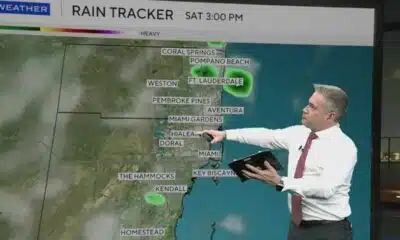News from the South - Florida News Feed
In Tampa, Florida Democrats talk candidly about their problems and hopes for future success
by Mitch Perry, Florida Phoenix
May 27, 2025
Donald Trump’s victory in November had led the Democratic Party nationally to engage in some serious soul searching. In Florida, it was the second successive electoral blowout, and the conversations about how to cope with that reality are underway.
Take the discussion held last Thursday night, sponsored by the Hillsborough County Democratic LGBTQ+ Caucus in Tampa.
“Democrats are the best at losing, losing, losing,” said Mike Drapak of The Hillsborough Society, a political commitee formed in the aftermath of party infighting with the Hillsborough County Democratic Executive Committee. “And that’s really where we need to start, and we need to start being self-reflective.”
Party members need to stop “pointing fingers” and instead look at themselves in the mirror start “understanding exactly what it is we’re doing that’s making people dislike us,” Drapak said.
The descent of the party has been well documented at this point. After losing all statewide races by double-digit deficits in 2022 and 2024, the party saw two members of their already super-minority in the state House of Representatives flip to the GOP last December, followed up last month with their then state Senate leader, South Florida’s Jason Pizzo, dramatically announcing on the floor that he was leaving the party because it was “dead.”
Gov. Ron DeSantis couldn’t resist pouncing on the party’s problems last week, declaring that Pizzo’s announcement that he would run for governor as a political independent was necessary “because people know if you have a ‘D’ next to your name in this state, you are dead meat. Because this party is a disaster.”
Much of the discussion last week among the Tampa Democrats last week centered on messaging. Nick Clemente, who lost a state House race to Republican Traci Koster in November, said the Florida Democratic brand is “unequivocally broken.”
“How do we talk about regular folks who might listen to podcasts about UFC, who might listen to podcasts about NASCAR or speed metal and not about politics?” he asked the audience of around 50 people. “How do we connect with them on our values and the things that we have in common that maybe we can help fix the brand, so people aren’t ashamed to be Democrats?”
Logan Mueller, president of the University of Tampa Democrats, said a major problem in his opinion is that the Democrats were still campaigning “like it’s 1996.”
“They’ve won the information battle right now,” he said of the GOP.
“With the internet and podcasts and videos, we do not have any boots on the ground. All the largest podcasts and these things that people are connected to are all very conservative. There is no means that we can push a message, and on top of that, we don’t have a unified message that we can share with everybody. We don’t have a positive economic message that everybody wants. The reason Trump was also partially successful was that he sold optimism. He sold making America great again.”
‘Too complicated’
Sabrina Bousbar agreed with Mueller.
The 28-year-old Pinellas native campaigned for Joe Biden in 2020 and later served as a senior adviser in his U.S. Department of Health & Human Services’ Administration for Strategic Preparedness and Response. She ran for Congress last summer, finishing second behind fellow Democrat Whitney Fox in Florida’s 13th District. (Fox went on to lose to GOP incumbent Anna Paulina Luna).
“We’re a little too complicated,” she said. “We try to have messaging for every single silo, but we don’t have a cohesive message with everyone.”
Mueller said he encounters a lot of his fellow students at UT who prefer registering as non-party-affiliated rather than a Democrat.
“They don’t want to associate with a party that has kind of lost the messaging war,” Mueller added. “[The party] has a lot of negative strings attached to it. And by registering as an independent, it kind of avoids the mess that has kind of been created over a long period of time. And the way forward is actually running an economic positive message, because young people do care about the economy, just as much as anyone else does.”
The fourth member of the panel was Tamika Lyles, an Osceola County Democrat seeking the party’s’s nomination for U.S. Senate next year. She complained that Democratic candidates wait too long to connect with the electorate.
“They don’t see us until it’s primary time or general election time, when we’re knocking on a door and we’re trying to give them that message. They’re not hearing it,” she said.”Because the first thing they say is, ‘Where have you been the whole year? What have you been doing the whole year?’ What was the messaging like the whole year when all of this was going on? So we need someone who is continuously speaking that language.”
A common theme among Democrats in the aftermath of the 2024 election nationally and in Florida is “meeting voters where they are.”
As someone who has worked with organized labor around the country, Drapek said, he’s found “a significant amount” of misogyny, homophobia, and racism in the American heartland.
“We need to understand that,” he said. “And we need to learn on how we can message in a way that doesn’t actually bring the most radical people of that end to the table, but some of the people who want some of the same things that we do.”
While there was plenty of talk about messaging, or the lack thereof, there wasn’t as much dialogue about policy and how to adjust to an electorate that has shifted to the right over the past five years.
Latino vote
When it comes to the Latino vote, a key demographic in Florida that supported Trump by double-digits over Kamala Harris last fall, a member of the Pinellas Hispanic Caucus suggested a possible opening would be to reengage specifically with Venezuelans who are upset about a U.S. Supreme Court decision last week that immediately strips Temporary Protected Status, or TPS, from hundreds of thousands of themselves.
In a survey of 408 Venezuelan residents in Florida conducted last month by Florida International University’s Latino Public Opinion Forum, nearly half of those who reported voting for Donald Trump in 2024 now say they either regret their decision or have mixed feelings about it. More than 70% say they oppose Trump’s decision to end humanitarian parole for Venezuelans.
“We should use this as ammunition,” said Bousbar, who is of Moroccan and Columbian descent. The GOP has targeted Latinos in Florida since Barack Obama left the political scene more than a decade ago.
“Latinos started going more Republican each election cycle. And so now, though, that we’re seeing the actual impact of this anti-immigration — illegally sending people back to their countries, or also putting them in jails without notification or telling their families or any form of legal structured procedure that they should have in the state and in the U.S. — we have to take that and communicate to them,” she said.
“We should be putting Spanish radio ads, Spanish TV messaging around the laws that Donald Trump has done around the Latino communities, specifically Venezuelans and Cubans and within the state of Florida because maybe we can get that pendulum to come back our way.”
YOU MAKE OUR WORK POSSIBLE.
Florida Phoenix is part of States Newsroom, a nonprofit news network supported by grants and a coalition of donors as a 501c(3) public charity. Florida Phoenix maintains editorial independence. Contact Editor Michael Moline for questions: info@floridaphoenix.com.
The post In Tampa, Florida Democrats talk candidly about their problems and hopes for future success appeared first on floridaphoenix.com
Note: The following A.I. based commentary is not part of the original article, reproduced above, but is offered in the hopes that it will promote greater media literacy and critical thinking, by making any potential bias more visible to the reader –Staff Editor.
Political Bias Rating: Center-Left
This article presents a critical yet introspective view of the Democratic Party’s struggles in Florida following recent electoral losses. It emphasizes the party’s need for self-reflection, improved messaging, and outreach to key demographics without dismissing conservative viewpoints outright. The focus is primarily on Democratic voices analyzing their own shortcomings and strategizing on how to reconnect with voters, which aligns with a center-left perspective that supports progressive reform while acknowledging political challenges. The coverage appears balanced in highlighting GOP successes and criticisms but centers on Democratic discourse and solutions.
News from the South - Florida News Feed
Florida man who killed 2 women set for lethal injection next month, extending execution record
SUMMARY: Florida Governor Ron DeSantis has signed a death warrant for Samuel Lee Smithers, 72, who is scheduled for execution by lethal injection on October 14 at Florida State Prison. Smithers was convicted for the 1996 murders of Christy Cowan and Denise Roach, whose bodies were found in a pond in Plant City. Smithers confessed to beating and strangling the women, and received two death sentences upheld by the Florida Supreme Court. This execution is part of DeSantis’s record-setting pace, with 14 executions slated in Florida for 2025, surpassing the previous annual record of eight since 1976.
The post Florida man who killed 2 women set for lethal injection next month, extending execution record appeared first on www.news4jax.com
News from the South - Florida News Feed
South Florida to see less showers in the coming days
SUMMARY: South Florida will see fewer showers in the coming days as a frontal boundary moves south, reducing rain chances from 50% to around 30-40% through Sunday and Monday. The atmosphere’s moisture is dropping, ending recent heavy rainfall and flooding. Showers will be scattered and lighter, unlike the intense storms earlier. Dry air behind the boundary will bring a needed break, allowing soil to recover before rain chances increase midweek. The tropics show a 40% chance of development in the eastern Atlantic, but it’s expected to move northward without impacting Florida. Overall, the weekend looks better with less rain and improving conditions.
CBS News Miami’s NEXT Weather Chief Meteorologist Ivan Cabrera’s weather outlook for South Florida.
For video licensing inquiries, contact: licensing@veritone.com
News from the South - Florida News Feed
Erika Kirks delivers fist remarks on husband Charlie Kirk's death: 'I will not your legacy die'
SUMMARY: Erika Kirk, widow of Charlie Kirk, spoke publicly for the first time since her husband’s tragic fatal shooting at a college event. Tearfully, she vowed to continue Charlie’s legacy, including his campus tour, radio show, and podcast. She emphasized that Charlie loved America and laid down his life for their nation and children. Police arrested a 22-year-old suspect in the shooting. Utah’s governor condemned the murder as an attack on American democracy and ideals, highlighting the rise in political violence. Erika refused to let the movement Charlie built die, pledging to uphold his vision despite the tragedy.
Erica Kirk, widow of conservative commentator Charlie Kirk, delivered her first public remarks Friday night, just two days after her …
-
News from the South - North Carolina News Feed6 days ago
Reagan era credit pumps billions into North Carolina housing | North Carolina
-
News from the South - Alabama News Feed6 days ago
Amid opposition to Blount County medical waste facility, a mysterious Facebook page weighs in
-
News from the South - Kentucky News Feed6 days ago
3 states push to put the Ten Commandments back in school – banking on new guidance at the Supreme Court
-
News from the South - South Carolina News Feed6 days ago
South Carolina’s Tess Ferm Wins Miss America’s Teen 2026
-
News from the South - West Virginia News Feed7 days ago
National Grandparents Day (9-7-25) and the special bond shared with their grandchildren
-
Local News6 days ago
Duke University pilot project examining pros and cons of using artificial intelligence in college
-
News from the South - Missouri News Feed5 days ago
1587 Prime gives first look at food, cocktail menu ahead of grand opening in KC
-
News from the South - Virginia News Feed5 days ago
On the record: Winsome Earle-Sears








































